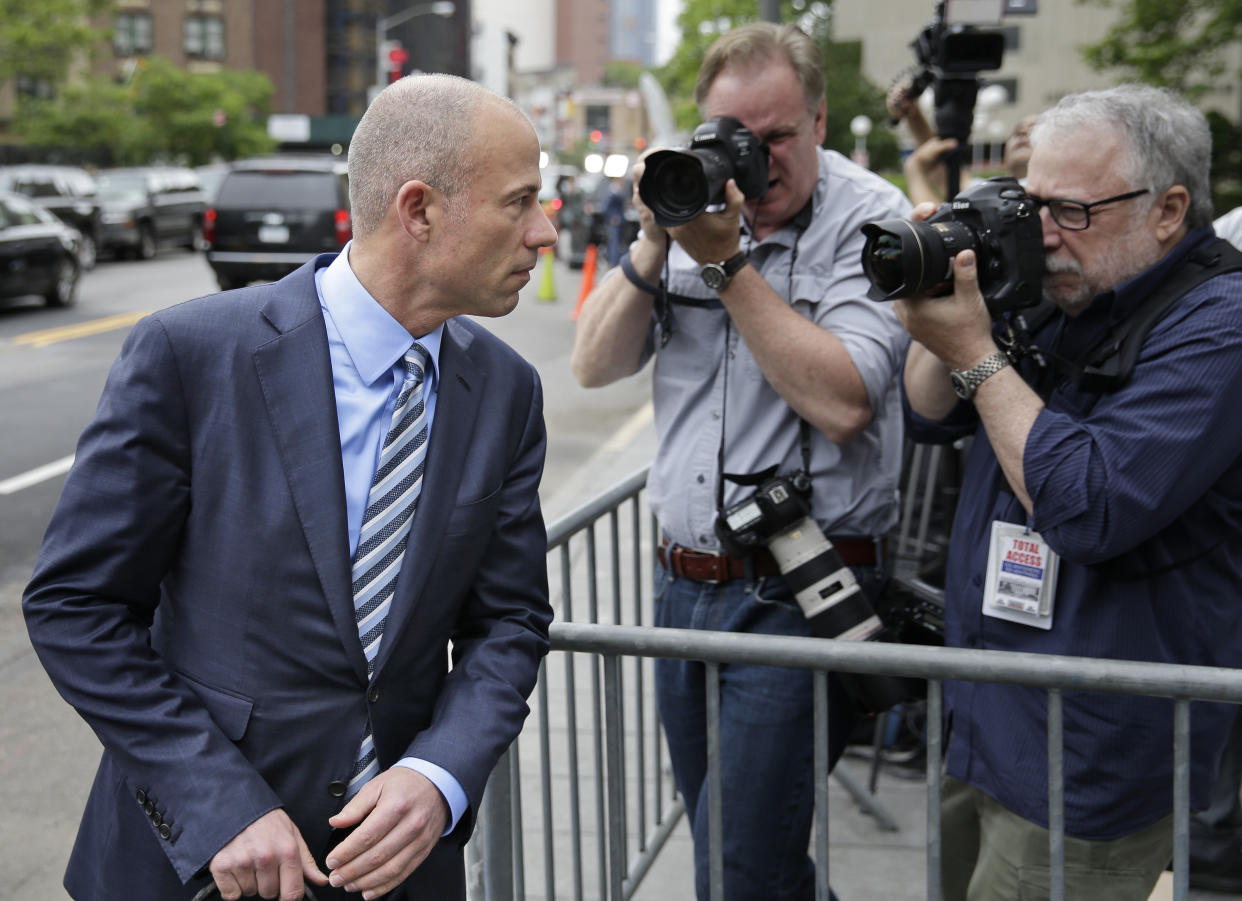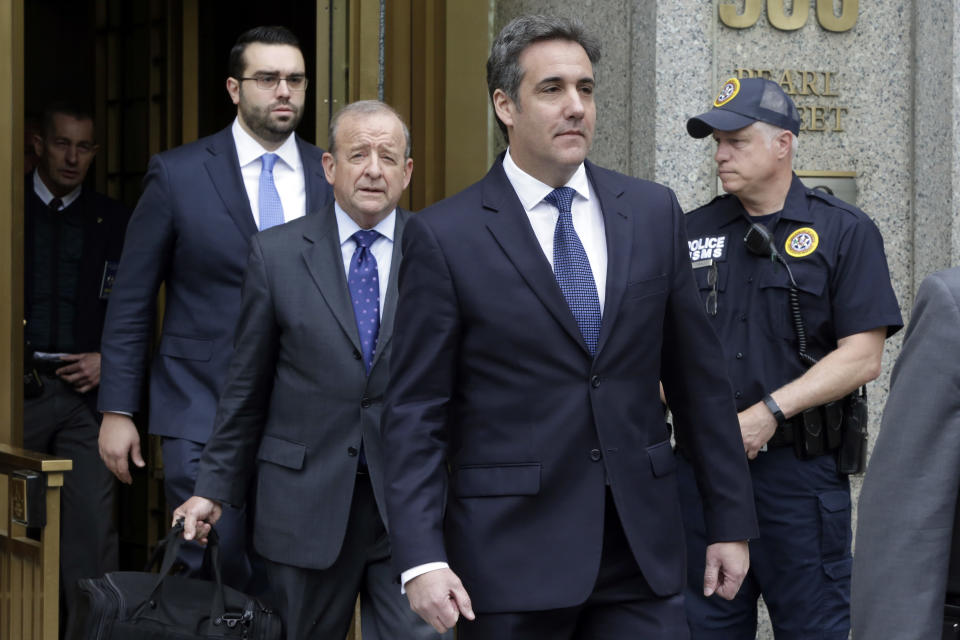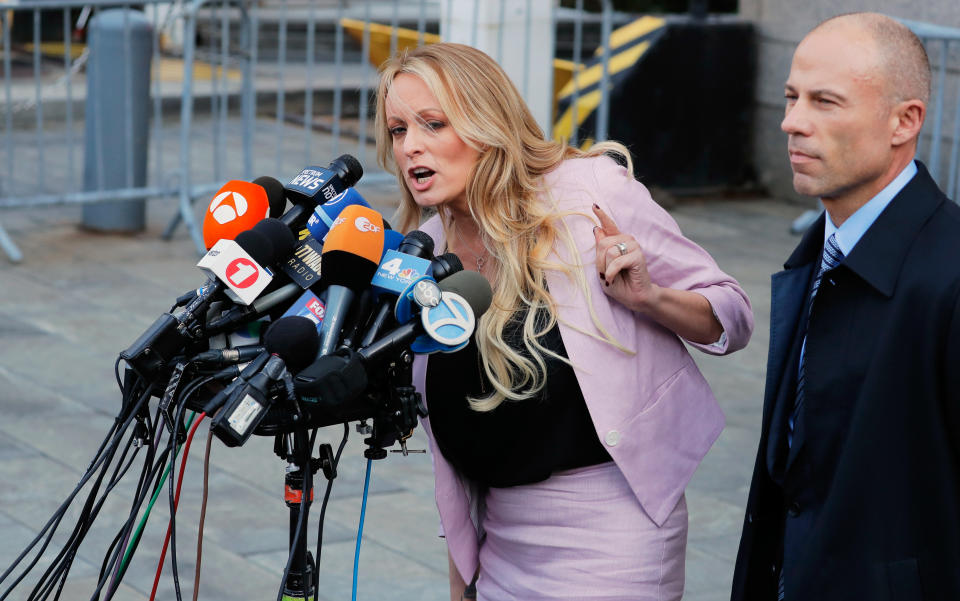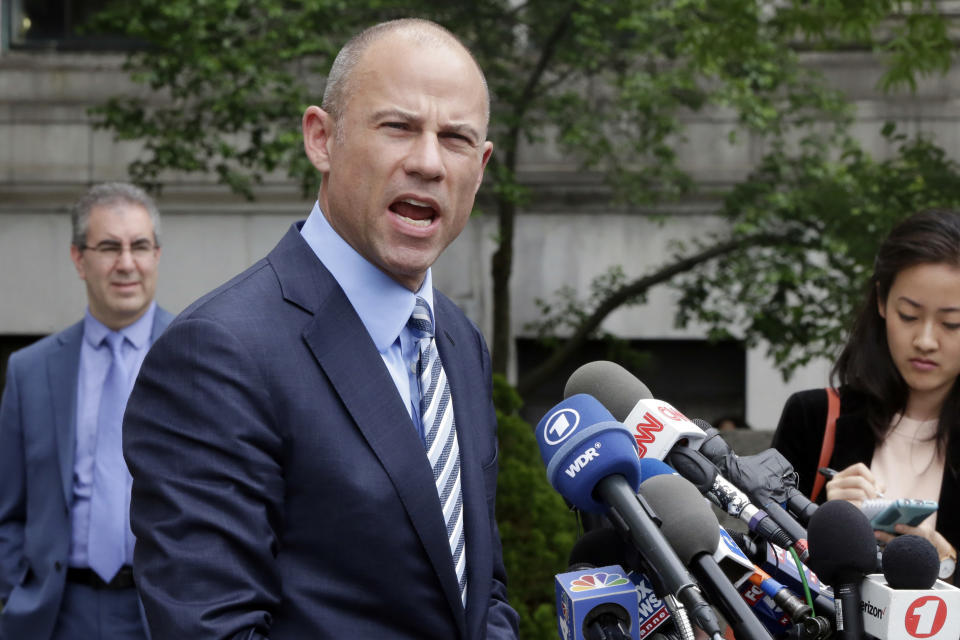Judge in Michael Cohen case admonishes Michael Avenatti over his 'publicity tour'

NEW YORK — Wednesday’s court hearing about the documents seized by the FBI from President Trump’s personal attorney, Michael Cohen, was largely focused on another lawyer, Michael Avenatti, who represents actress Stormy Daniels and has become one of cable news’ most ubiquitous faces in the process.
Cohen’s team accused Avenatti of staging a legal “drive-by shooting” against Cohen. And Avenatti implied he has information that the raid unearthed, what he described as “disturbing” tapes of a conversation between Cohen and Daniels’s former lawyer.
Daniels, whose real name is Stephanie Clifford, is suing both Trump and Cohen to get out of a confidentiality agreement that prevents her from discussing her encounter with the president in 2006. Cohen has admitted giving Daniels a $130,000 payment in exchange for her silence, though he denies she had a sexual liaison with Trump. Daniels is separately suing Cohen for defamation because he accused her of lying about the alleged affair. Trump and his lawyers have given conflicting accounts of whether the president was aware of Cohen’s deal with Daniels.
On April 26, Avenatti filed a motion to allow Daniels to intervene in Cohen’s case. The motion, which was opposed by Cohen’s team, is under consideration by Judge Kimba Wood in U.S. district court in Manhattan. The proceedings are at the stage of determining which documents seized by the FBI from Cohen’s office and residences will be made available to prosecutors. The FBI raid was part of a criminal investigation into Cohen’s business dealings and payments he made to Daniels and at least one other woman, who also claimed to have had a relationship with Trump.
Wood has appointed a special master to work with Cohen’s attorneys and prosecutors to determine which documents are privileged. In his request to allow Daniels to intervene, Avenatti argued that the raid may have included documents that could be subject to her attorney-client privilege. And attorneys for both Trump and Cohen have also that argued some of the seized materials may be privileged.

But Wednesday’s hearing revolved, in part, around Avenatti himself, including his financial dealings and the nearly 200 television appearances he has made since taking on Daniels’s case. Wood warned him that if he does formally enter the case, “you would have to stop doing some of the things you’ve been doing.”
Specifically, she said that Avenatti, who has routinely criticized Trump and Cohen on Twitter and television, would have to refrain from issuing “opinions on Mr. Cohen’s guilt.” Wood also said Avenatti could not disclose the contents of nonpublic documents. She suggested that she either wanted Avenatti to behave as a participating attorney in the case while Daniels’s application to intervene is held in abeyance or to remove himself.
“I don’t want you to exist in some kind of limbo where you are able to denigrate Mr. Cohen and potentially contaminate the jury pool,” said Wood.
The judge also warned Avenatti that he would not be able to continue his “publicity tour” if he formally participated in the case.
“I say ‘publicity tour’ not in a derogatory sense. You’re entitled to publicity, I can’t stop you. Unless you’re participating in a matter before me,” said Wood.
Avenatti said he was willing to have Daniels’s motion to intervene held in abeyance. But he also brought up the issue of “disturbing” tapes he said were made by Cohen to make the case that Daniels’s application would need to be dealt with “sooner or later.”
According to Avenatti, he became aware of the recordings when a “member of the press” called him last week to ask about a taped conversation between Cohen and Daniels’s former attorney, Keith Davidson. Avenatti said the unnamed reporter told him this conversation included references to Daniels. He expressed concerns that the tape was made in the first place and that the press was made aware of it, suggesting this could have been a violation of Daniels’s attorney-client privilege.
Davidson did not respond to an email from Yahoo News asking whether he discussed Daniels with Cohen and if he knew their conversation was taped.
Avenatti went on to argue there were only “two sources” that could have leaked a tape of Cohen and Davidson to the press. He said the first potential source would have been the FBI or U.S. attorneys, but he said and he highly doubted law enforcement would have given a recording to reporters. Therefore, Avenatti said the leak “had to” have come from “Cohen or someone close” to him. Avenatti suggested Cohen would have leaked the tape to “plant a false narrative” about Daniels.

Wood responded to this dramatic tale of the tape by saying Avenatti had “no standing” to raise the issue unless he is formally participating in the case. And the judge suggested she has some concern about admitting Avenatti to the proceedings, specifically the he “might share something” he saw that was not public.
Stephen Ryan, one of Cohen’s attorneys, then jumped in and addressed the issue that likely sparked the judge’s fears.
“I’ve never seen an attorney conduct himself in the way Mr. Avenatti has,” Ryan began.
Ryan said he was alarmed by Avenatti’s publication of a report that detailed how Cohen received $500,000 from a Russian oligarch. That payment was subsequently confirmed, but Avenatti’s report also included details about accounts belonging to two other people named “Michael Cohen.”
“It was a drive-by shooting of anyone named Michael Cohen,” Ryan said.
The New Yorker subsequently published an interview with an anonymous law enforcement official who acknowledged leaking the information about Cohen’s bank account because reports relating to it had gone missing from a government database.
In court on Wednesday, Ryan described Avenatti’s publication of the information as a “malicious” act that was designed to “prejudice” potential jurors who could be called if Cohen eventually faces charges stemming from the investigation into him.
“It was a premeditated drive-by shooting of my clients’ rights,” Ryan said.
Ryan also pointed to Avenatti’s spate of media appearances and accused the lawyer of having given the banking report to news outlets under embargo to maximize press coverage.
“This is absolute aggrandizement of a single attorney and his client,” Ryan said of Avenatti’s media blitz.
Ryan also denied Avenatti’s claim that Cohen was leaking tapes of conversations with Davidson.
“If we had released audio to a reporter, it would have been the biggest story in America,” said Ryan. “It has not occurred.”
The Washington Post has reported that Cohen “sometimes taped” his conversations. Ryan said that if there was any audio recording involving Daniels in Cohen’s possession it would be under “lock and key,” along with the rest of the items seized in the raid. He urged the judge to hold Daniels’s application to intervene in abeyance and keep Avenatti out of the case for now.
“Because who knows what’s going to drip out next week,” Ryan said.
Avenatti returned to discussing the tapes and said Ryan “confirmed” the existence of the audio with his comment that any recordings would be secure. It was somewhat of a stretch. Ryan’s carefully worded statement remained in the realm of the hypothetical and referred to tapes that might exist.

Joanna Hendon, who is representing President Trump, joined with Ryan’s push to keep Avenatti from participating in the case. Trump is intervening in the case to ensure that documents detailing his privileged communications with Cohen are not provided to prosecutors. Hendon said that, on Trump’s behalf, she “fully” endorses Ryan’s objections to Avenatti. She noted that outside the court on Wednesday morning a podium had been set up with “eight microphones” in front of a group of waiting reporters.
“I don’t believe that podium was there for me, Mr. Ryan or Michael Cohen,” said Hendon, implying that Avenatti brought the media circus.
Avenatti pointed out that there would be “press attention” to a case involving the president’s personal attorney regardless of his own participation. This reporter has made numerous attempts to speak with Ryan, Hendon and Cohen. After the hearing Wednesday, Cohen ignored shouted questions from a jostling crush of reporters as he sped off in a waiting SUV.
Avenatti’s media blitz isn’t the only issue the other attorneys have cited in their objections to his participation. In court filings, Cohen’s legal team has pointed to a $10 million bankruptcy judgment against Avenatti’s law firm, Eagan Avenatti.
Avenatti addressed this in court on Wednesday and said the firm was not representing Daniels — he was, personally. Hendon then presented a document to Judge Wood. Avenatti leapt up to complain.
“Your honor, I have no idea what this is,” Avenatti said.
“You don’t need to speak yet,” Wood replied curtly. “I don’t either.”
Hendon said the document included emails from the Eagan Avenatti firm to Trump’s legal team. She said this proved Avenatti was “not straightforward” when he said the firm was not representing Daniels.
As she concluded the proceedings by announcing deadlines for future document production, Wood turned to Avenatti.
“Until you are admitted, you can’t stand and be heard here,” Wood said, adding, “I can’t control what you do outside.”
After the hearing, Avenatti proceeded to the podium outside the courthouse, where he discussed the hypothesized recordings of Cohen and Davidson, dubbing them “The Trump Tapes,” although there’s nothing to suggest that, if they exist, the president was even aware of the conversations.
With that, Avenatti’s courthouse show came to an end — for now.
Following the proceedings, Avenatti withdrew his motion to appear on Daniels’s behalf, but he told Yahoo News he will refile the motion “when and if” the judge grants Daniels’s request to intervene. Theoretically, Daniels could be allowed to enter the proceedings but the judge could require her to use a different attorney. Either way, safe to say, the public will be hearing more from Avenatti.
Read more from Yahoo News:


